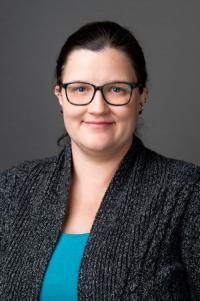
Specialization:
Psycholinguistics; sentence production; sentence processing; memory and language; eye-tracking; quantitative methods; meta-science
Education:
2014 PhD University of Illinois
2011 MA University of Illinois
Bio:
There is more than one way to convey most ideas using language: almost any picture could be described in multiple ways (it's a couch/ sofa/ it's Mom's favorite place to sit), using multiple grammatical forms (the dog is being chased by the cat/ the cat chases the dog; the staff is/ are on strike). This means that speakers must juggle multiple possible representations while preparing to speak, and listeners must be able to expect more than one candidate utterance from a speaker.
Similarly, a lot of language use also occurs in the context of conversation, which means that one often needs to plan an utterance while simultaneously listening to an interlocutor. This means that in order to be resilient speakers and listeners, our cognitive facilities must allow us to simultaneously represent -- and navigate between-- multiple ideas and multiple linguistic plans.
My work focuses on the question of how individuals integrate multiple candidate representations of meaning (words, ideas) and form (syntax, phonology) through time in language production and comprehension with support from cognitive mechanisms such as memory and attention. I test this using a variety of methods: eye-tracking (in production and comprehension, with one and two participants simultaneously), RT or behavioral studies, and computational modeling.
If you are interested in working with me as a graduate or undergraduate student-- please get in touch!
Projects:
Research questions I am currently interested in include:
- What do we need to mentally represent while listening and speaking in a single-task or in a conversational (dual-task) context? How does this vary based upon the communicative goals of the situation?
- How do speech errors (agreement errors, lexical choice errors) reflect mental representations of meaning and structure?
- How do listeners interpret / process / represent errors or variable forms? How does this change with experience?
- What memory mechanisms does language recruit? Does this differ between production and comprehension?
- How does splitting one's attention between speaking and listening affect production? What planning strategies allow us to do this successfully-- and what causes us to fail?
Publications:
Some representative publications are listed below; student collaborators are listed in italics.
Feel free to contact me by email if you would like copies of these or any of my other papers.
Brehm, L. (2023). What's an error anyway? Speaker- and listener-centered approaches to studying language errors. Psychology of Learning and Motivation.
Brehm, L. & Alday, P. (2022). Contrast coding choices in a decade of mixed models. Journal of Memory and Language.
Brehm, L., Cho, P.W., Smolensky, P. & Goldrick, M. (2022). PIPS: A parallel planning model of sentence production. Cognitive Science, 46(2), e13079.
Brehm, L. & Meyer, A.S. (2021). Planning when to say: Dissociating cue use in utterance initiation using cross-validation. Journal of Experimental Psychology: General, 150(9), 1772-1799.
He, J., Meyer, A.S, & Brehm, L. (2021). Concurrent listening affects speech planning and fluency: The roles of representational similarity and capacity limitation. Language, Cognition, and Neuroscience, 36(10), 1258-1280.
Brehm, L., Jackson, C., & Miller, K. (2021). Probabilistic online processing of sentence anomalies. Language, Cognition, and Neuroscience, 36(8), 959-983.
Zormpa, E., Meyer, A.S., & Brehm, L. (2019). Slow naming of pictures facilitates memory for their names. Psychonomic Bulletin & Review, 26(5), 1657-1682.
Brehm, L., Jackson, C., & Miller, K. (2019). Speaker-specific processing of anomalous sentences. Quarterly Journal of Experimental Psychology. 72(4), 764-778.
Brehm, L., Taschenberger, L., & Meyer, A. S. (2019). Mental representations of partner task cause interference in picture naming. Acta Psychologica, 199:102888.
Brehm, L., & Goldrick, M. (2017). Distinguishing categorical and gradient structure in language: Insights from verb-particle constructions. Journal of Experimental Psychology: Learning, Memory, and Cognition, 43(10), 1537-1556.
Brehm, L., & Bock, J.K. (2013). What counts in number agreement? Cognition, 128, 149-169.
